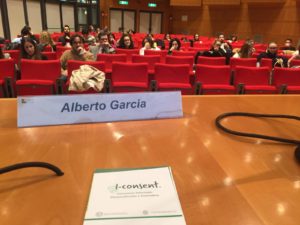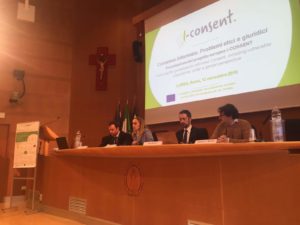Apr 4, 2019
On April 11, LUMSA University is organizing a seminar to discuss the progress of the i-CONSENT project. Prof. Barbara Prainsack Professor at the Department of Global Health & Medicine at King’s will be present to give a lecture on “The concept of solidarity: between theory and practice”. A detailed program will follow.
Apr 4, 2019
On Friday 5 April (15: 30-19: 00, Master Classroom, 1st floor) the Group of Neurobioethics, coordinated by our Chair fellow Fr. Alberto Carrara, L.C., is organizing an interdisciplinary dialogue entitled: Law and Life: dignity in living and dying between informed consent, advance treatment provisions and the ordinance n.207 of 2018 of the Constitutional Court. The speakers are: Avv. Emanuela Cerasella, Avv. Tania Cerasella, Dr. Francesco Ognibene, Dr. Suor Costanza Galli, Prof. Giuseppe Noia and Dr. Angelo Mainini.
Download the Italian Flyer
Program
15:30
Greetings from the Academic Authorities
Presentation
Prof. Father Alberto Carrara, L.C.
(Coordinator GdN, Corresponding Member of the Pontifical Academy for Life)
4:00 pm
Coordinates and introduces legal issues
Avv. Emanuela Cerasella
(Lawyer of the Court of Rome, patron of the Supreme Court of Cassation and other superior jurisdictions; coordinator of the neuro-law research and subgroup of the GdN)
16:30
“The sacredness of the good life and the centrality of the constitutional triad: life, person and dignity in the anticipated treatment provisions. Communication at the heart of DAT. Which legal institute recognize in the DAT? “
Avv. Tania Cerasella
(Advocate for the Court of Rome before the Supreme Court of Cassation and other higher jurisdictions, member of the GdN)
17:00
“Media: questions of life and death”
Dr. Francesco Ognibene
(Editor-in-chief of Avvenire, Coordinator of the weekly “E ‘Vita” insert)
17:30
“Palliative care as an antidote to euthanasia and therapeutic obstinacy, in the light of law n. 219/2017 “
Dr. Suor Costanza Galli
(Director of the complex palliative care unit – Tuscany North / West company)
18:00
“The boundaries of life in curing the incurables: always taking care of”
Prof. Giuseppe Noia
(Director, Perinatal Hospice – Center for Prenatal Palliative Care – S. Mother Teresa of Calcutta – Gemelli Hospital, Rome; President of the Heart Foundation in a Goccia-Onlus; President AIGOC)
18:30
“Born to live and born to die, the experience of care and assistance to people with advanced disease”
Dr. Angelo Mainini
(Health Director of the “Maddalena Grassi Foundation” in Milan)
19:00 Conclusions
Dr. Francesco Ognibene
Buffet
Jan 17, 2019
On January 31st the i-CONSENT Consortium will gather in Rome to provide an overview of main findings of i-CONSENT Project and to discuss comments elaborated by IBC members. The Consortium will also identify any gap in i-CONSENT work and suggest actions to improve strategies aimed at increasing participation of human subjects from multicultural backgrounds in clinical trials.
UNESCO Chair Director, Prof. Alberto Garcia will analyze Informed Consent from a multicultural and interreligious perspective.
Follow this link to read the program.
Expected participants from UNESCO IBC and Università degli Studi di Roma “Tor Vergata” :
Stefano Semplici Università degli Studi di Roma “Tor Vergata”
Johannes JM van Delden UNESCO IBC
Dafna Feinholz UNESCO IBC
Derrick Aarons UNESCO IBC
Pamela Andanda UNESCO IBC
Dirceu Bartolomeu Greco UNESCO IBC
Richard Magnus UNESCO IBC
Federico Jääskeläinen Montalvo UNESCO IBC
Evariste Likinda UNESCO IBC
Marie-Genevieve Pinsart UNESCO IBC
Lizbeth Sagols Sales UNESCO IBC
Delia Maria Sanchez Varela UNESCO IBC
Yuthavong Yongyuth UNESCO IBC
Paulina Tindana UNESCO IBC
Dec 3, 2018
On December 10th and 11st, our Director Alberto Garcia and Research Scholar Mirko Garasic, will participate in the Coordination Meeting in Madrid to discuss the progress of the i-Consent project.


 He also approached the tensions that arise from a conceptualization of IC that depends on a notion of individual autonomy that is not shared by all cultures and religions: while western culture tends to give importance to the individual and his or her rights, eastern traditions use to put more weight on community and the duties that derive from it. Thinking about how each major religious tradition (namely Buddhism, Confucianism, Christianity, Judaism, Hinduism and Islam) views IC in accordance to their doctrine and traditions will help to outline defined goals for the effectiveness of i-CONSENT.
He also approached the tensions that arise from a conceptualization of IC that depends on a notion of individual autonomy that is not shared by all cultures and religions: while western culture tends to give importance to the individual and his or her rights, eastern traditions use to put more weight on community and the duties that derive from it. Thinking about how each major religious tradition (namely Buddhism, Confucianism, Christianity, Judaism, Hinduism and Islam) views IC in accordance to their doctrine and traditions will help to outline defined goals for the effectiveness of i-CONSENT.